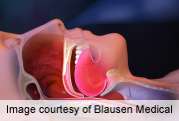Sleep-disordered breathing severity is associated with lower functional aerobic capacity and increased blood pressure, according to a study published in the June 1 issue of The American Journal of Cardiology.
(HealthDay)—Sleep-disordered breathing (SDB) severity is associated with lower functional aerobic capacity (FAC) and increased blood pressure, according to a study published in the June 1 issue of The American Journal of Cardiology.
Meghna P. Mansukhani, M.B.B.S., from the Mayo Clinic in Rochester, Minn., and colleagues evaluated 1,424 adults (mean age, 56.4 years; 75 percent male) who underwent exercise testing within six months before first-time diagnostic polysomnography. Subjects were grouped by apnea-hypopnea index (AHI): <5, 5 to 14, 15 to 29, and ?30.
The researchers found that mean body mass index was 32.4 kg/m² and mean AHI was 19.5 per hour. AHI was significantly negatively correlated with FAC and post-exercise systolic blood pressure. AHI was significantly positively correlated with resting and peak diastolic blood pressure (DBP). Compared to patients without SDB (AHI <5), those with severe SDB (AHI ?30) had significantly lower FAC and heart rate recovery and significantly higher resting, peak, and post-exercise DBP, after accounting for other variables.
"Even after accounting for confounders, severe SDB was associated with attenuated FAC, impaired heart rate recovery, and higher resting, peak, and post-exercise DBP," the authors write.
Several authors disclosed financial ties to the medical device industry.
More information:
Abstract
Full Text (subscription or payment may be required)
Journal information: American Journal of Cardiology
Health News Copyright © 2013 HealthDay. All rights reserved.



















